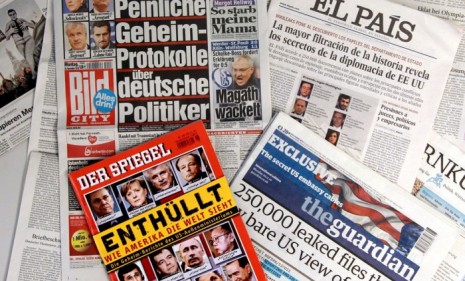WikiLeaks' 'cablegate': World reactions
The massive dump of sensitive diplomatic cables has embarrassed the U.S. What do other countries think?

A free daily email with the biggest news stories of the day – and the best features from TheWeek.com
You are now subscribed
Your newsletter sign-up was successful
WikiLeaks' slow unveiling of more than 250,000 sensitive embassy cables is roiling the diplomatic world. The revelations have divided opinion in the U.S. over what to do about the whistleblower website and its founder Julian Assange, as well as what the fallout from the leaks might be. (See The Week columnist David Frum's take.) What do opinion makers think in other countries touched by "cablegate"? Here's a survey:
"Cablegate" reveals nothing "shocking nor terrible" Haaretz, Israel
Despite the breathless excitement over the leak of these diplomatic cables, "no great tragedy has occurred," says Haaretz in an editorial. And that's no surprise. Diplomats in a "real democracy" like the U.S. already knew that their words could be published one day through the Freedom of Information Act, or "malice." That's especially true "in the case of U.S.-Israel relations," where "it seems each side is predisposed to be suspicious that the other side — or even their own — might leak the content of sensitive talks in a bid to either sabotage or constrain them."
The Week
Escape your echo chamber. Get the facts behind the news, plus analysis from multiple perspectives.

Sign up for The Week's Free Newsletters
From our morning news briefing to a weekly Good News Newsletter, get the best of The Week delivered directly to your inbox.
From our morning news briefing to a weekly Good News Newsletter, get the best of The Week delivered directly to your inbox.
This is clear proof of U.S. and Saudi hypocrisy The Nation, Pakistan
The "diplomatic bombshell" Assange set off shows "the machinations of the more powerful to undercut the core national interests of weaker nations," says Pakistan's The Nation in an editorial. In Pakistan, we learned that Saudi King Abdullah, "a close and sincere friend" of Pakistan, thinks President Asif Ali Zardari "is rotten," and that the U.S., despite its public "bonhomie," "has an eye on our nuclear assets" and wants to "enfeeble Pakistan" by strengthening India. WikiLeaks rendered an invaluable "service" by "exposing American hypocrisy."
These revelations can be good for diplomacy and aid the public The Standard, Kenya
"Kenya was not spared" in this embarrassing "trail of diplomatic gaffes, opinion — qualified or otherwise," says Nairobi's The Standard in an editorial. Knowing what someone really thinks about you can be "sobering," but the U.S. "diplomats' frequent reminders that Kenyan leaders need to stay within the straight and narrow" shouldn't hurt our long friendship with the U.S. In fact, now leaked, they might even act as a welcome "public watchdog much better than some of our state institutions."
A free daily email with the biggest news stories of the day – and the best features from TheWeek.com
Exposed lies and illegal actions confirm that the U.S. is "two-faced" Hankyoreh, South Korea
WikiLeaks has "lifted the filter from the scandalous hidden side of... a country that claims to be a bastion of free democracy," says The Hankyoreh in an editorial. But the "illegal measures" revealed, such as spying on U.N. officials and lying about bombing Yemen, merely "confirm once again that the U.S. has not changed this kind of behavior" since the Gulf of Tonkin in Vietnam or the overthrow of Salvador Allende in Chile. Unless the U.S. can regain our trust, "Korea must now bear in mind the two-faced nature of the U.S. in maintaining diplomatic relations with its government."
Where is the scandal? Folha, Brazil
This is "all just a journalistic spectacle," says Clóvis Rossi in Brazil's Folha. I'd welcome anything new or revealing, but keeping opinionated notes on the local media, business, and politicians — "does anyone out there doubt that this is how embassies of the United States work?... All global and regional powers work in the exact same way, including Brazil." Furthermore, most of the leaked opinions are pretty tame. The U.S thinks Brazil's government is a "heap of leftist militants"? So does Brazil's president, Luiz Inácio Lula da Silva, proudly.
The U.S. can survive a "cablegate." China could not Global Times, China
The U.S. should not let WikiLeaks keep on "embarrassing the world's most powerful country," says China's Global Times in an editorial. Uncle Sam can fix most of these "sensational" but "minor" leaks with "some remedial work." However, "once WikiLeaks sets its sights on other countries, the fallout could be drastic." The release of "so much sensitive information" could "severely damage the social stability" of other nations. Countries like China "must have a line of defense against a hurtful information campaign."